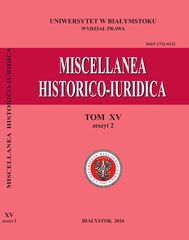Prawo zrzeszania się w związkach zawodowych w aspekcie normatywnym oraz myśli politycznej w Polsce Ludowej do 1980 r.
The right of association in trade unions in terms of normative and political thought in the PRL until 1980
Author(s): Marcin KazimierczukSubject(s): Politics / Political Sciences, Law, Constitution, Jurisprudence, History of Law, Civil Law
Published by: Wydawnictwo Uniwersytetu w Białymstoku
Keywords: trade unions; to associate; political doctrine; restrictions of the right of association
Summary/Abstract: After the end of World War II, in the then new arena of political reality, the trade union movement entered the era of monism characterized by the fact that in labour relations only one organizational structure functioned that represented the interests of employees working under direct control of the state. In contrast to the interwar period in which there had been tremendous growth of the union movement thanks to the conditions created by the first of the reborn Polish governments, the realities of Polish socialism was a top-down ideological and organizational unification of the trade unions operating in various sectors of the economy, as well as nationwide. The trade unions became uniform, centralized entities, based on the principle of centralism and with essentially the same organizational structure. The trade union movement in Poland after the Second World War was organized on the concept of doctrinal W.I. Lenin, which developed as a result of sharp discussions that took place in the Russian Communist Party in the years 1918-1922.
Journal: Miscellanea Historico-Iuridica
- Issue Year: 15/2016
- Issue No: 2
- Page Range: 327-342
- Page Count: 16
- Language: Polish

